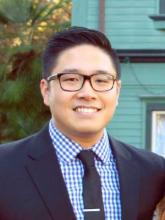SAN DIEGO – Children with refractory constipation may benefit from sacral nerve stimulation, although complications are common, according to a study that found benefits over more than 2 years, as well as evidence that parents like the treatment.
Sacral nerve stimulation is an accepted treatment for refractory constipation in adults, but long-term research in kids has been lacking.
The current study showed that sacral nerve stimulation (SNS) “can be used successfully for some children with intractable constipation, and the improvement seen with SNS treatment can be durable,” said study lead author Dr. Peter Lu, a pediatric gastroenterology fellow with Nationwide Children’s Hospital in Columbus, Ohio. “However, much more research is needed before more widespread adoption of SNS for treatment of this population.”
An estimated 12% of children suffer from constipation, and about 10% of those will still have symptoms despite laxative use, said Dr. Lu, who presented the findings at the annual Digestive Disease Week.
“We regularly see children in our GI clinic who have severe constipation leading to frequent episodes of overflow fecal incontinence, often throughout the day at school,” Dr. Lu said. “As you might imagine, this is incredibly embarrassing and isolating.”
According to Dr. Lu, treatments include anal sphincter botulinum injection, antegrade continence enema (ACE), colonic resection, and SNS.
Adult research has shown that SNS is effective in the treatment of constipation and fetal incontinence, Dr. Lu said, but research in children is limited and only looked at effects over a period of 4-12 months. “The durability of symptom improvement has not been really shown,” he said.
Dr. Lu and associates tracked 25 children (52% male; mean age, 14.0 years) with refractory constipation: 17 had functional constipation, 6 had an anorectal malformation, 1 had Hirschsprung’s disease, and 1 had a tethered cord. Comorbid conditions included fecal incontinence (18, 72%) and urinary symptoms (16, 64%). Thirteen (52%) used ACEs at baseline.
At the most recent follow-up, the number using laxatives fell from 16/64% to 11/44% (P = .16).
Of 13 subjects using ACEs, 8 (62%) had undergone closure of their appendicostomy or cecostomy and the other 5 (38%) had reduced ACE frequency by follow-up. ACE use fell from 12/48% to 5/20% (P = .03).
Scores on the PedsQL GI Symptom Scale and Fecal Incontinence Severity Index and on most Fecal Incontinence Quality of Life Scale domains had improved at follow-up.
At a mean of 2.4 years for constipation scores and 1.8 years for symptom scores, 16 parents completed questionnaires. Median Glasgow Children’s Benefit Inventory (GCBI) scores were +42.7 (interquartile range, 23.4-77.1), and 15 (94%) reported GCBI scores greater than 0. Fourteen (88%) said they’d allow their children to undergo SNS again if they could make the choice once more.
“Almost all reported benefit from SNS,” Dr. Lu said, “and all would still recommend SNS to other families with children who have similar symptoms.”
However, six patients (24%) had complications requiring surgery; four of those needed SNS replacement.
There are remaining questions. For one, “the mechanism of SNS treatment remains unclear,” Dr. Lu said. “We suspect that SNS leads to improvement by modulating anorectal function, and there has also been evidence that SNS can affect colonic motility. We are currently studying this further and hope to have a better understanding of how the treatment works soon.”
Dr. Lu and colleagues are also studying why patients have complications, with an eye toward identifying risk factors.
In a question and answer session, Dr. Lu acknowledged that many patients were lost to follow-up; some moved away. “Part of it was that we didn’t have the time to really track them down,” he said. “That’s something we definitely have to look at.” However, he noted that the 16 parents who did respond accounted for 5 of the 6 children who encountered complications.
Dr. Lu said he doesn’t recommend widespread use of SNS in children. “We need to have a better understanding of which patients will benefit from SNS and which patients will not,” Dr. Lu said.
No funding was reported. Dr. Lu had no relevant financial disclosures.


